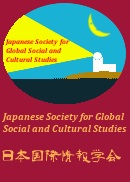Volume 1, Issue 1
The Journal of Japanese Society for Global Social and Cultural Studies 1_1
Displaying 1-8 of 8 articles from this issue
- |<
- <
- 1
- >
- >|
Original2004
-
2004 Volume 1 Issue 1 Pages 1-9
Published: May 10, 2004
Released on J-STAGE: January 02, 2017
Download PDF (45K) -
2004 Volume 1 Issue 1 Pages 10-24
Published: May 10, 2004
Released on J-STAGE: January 02, 2017
Download PDF (198K) -
2005 Volume 1 Issue 1 Pages 25-36
Published: May 10, 2005
Released on J-STAGE: January 02, 2017
Download PDF (279K) -
2004 Volume 1 Issue 1 Pages 37-48
Published: May 10, 2004
Released on J-STAGE: January 02, 2017
Download PDF (209K) -
2004 Volume 1 Issue 1 Pages 49-60
Published: May 10, 2004
Released on J-STAGE: January 02, 2017
Download PDF (125K) -
2004 Volume 1 Issue 1 Pages 61-72
Published: May 10, 2004
Released on J-STAGE: January 02, 2017
Download PDF (201K) -
2004 Volume 1 Issue 1 Pages 73-84
Published: May 10, 2004
Released on J-STAGE: January 02, 2017
Download PDF (177K) -
2004 Volume 1 Issue 1 Pages 85-96
Published: May 10, 2004
Released on J-STAGE: January 02, 2017
Download PDF (177K)
- |<
- <
- 1
- >
- >|
